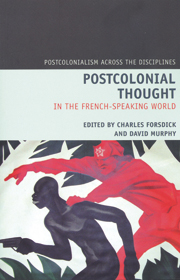Book contents
- Frontmatter
- Contents
- Acknowledgements
- Introduction: Situating Francophone Postcolonial Thought
- Section 1 Twelve Key Thinkers
- Section 2 Themes, Approaches, Theories
- 13 Postcolonial Anthropology in the French-speaking World
- 14 French Theory and the Exotic
- 15 The End of the Ancien Régime French Empire
- 16 The End of the Republican Empire (1918–62)
- 17 Postcolonialism and Deconstruction: The Francophone Connection
- 18 Negritude, Présence Africaine, Race
- 19 Francophone Island Cultures: Comparing Discourses of Identity in ‘Is-land’ Literatures
- 20 Locating Quebec on the Postcolonial Map
- 21 Diversity and Difference in Postcolonial France
- 22 Colonialism, Postcolonialism and the Cultures of Commemoration
- 23 Gender and Empire in the World of Film
- 24 From Colonial to Postcolonial: Reflections on the Colonial Debate in France
- Notes on Contributors
- Bibliography
- Index
24 - From Colonial to Postcolonial: Reflections on the Colonial Debate in France
from Section 2 - Themes, Approaches, Theories
- Frontmatter
- Contents
- Acknowledgements
- Introduction: Situating Francophone Postcolonial Thought
- Section 1 Twelve Key Thinkers
- Section 2 Themes, Approaches, Theories
- 13 Postcolonial Anthropology in the French-speaking World
- 14 French Theory and the Exotic
- 15 The End of the Ancien Régime French Empire
- 16 The End of the Republican Empire (1918–62)
- 17 Postcolonialism and Deconstruction: The Francophone Connection
- 18 Negritude, Présence Africaine, Race
- 19 Francophone Island Cultures: Comparing Discourses of Identity in ‘Is-land’ Literatures
- 20 Locating Quebec on the Postcolonial Map
- 21 Diversity and Difference in Postcolonial France
- 22 Colonialism, Postcolonialism and the Cultures of Commemoration
- 23 Gender and Empire in the World of Film
- 24 From Colonial to Postcolonial: Reflections on the Colonial Debate in France
- Notes on Contributors
- Bibliography
- Index
Summary
Over the past two decades, postcolonial studies – or postcolonial theory – has firmly established itself within the Anglophone academy. In France, however, the perception of this critical body of thought labours under a certain number of misconceptions that have rendered the development of an equivalent ‘hexagonal’ movement deeply problematic, and have given rise instead to a determined opposition in the general ‘intellectual field’. By ‘intellectual field’ we mean the broad domain constituted by publications and debates in the social sciences, particularly sociology, history, political sciences and, more marginally, anthropology. This ‘intellectual field’ includes academic publications, but also essays by public intellectuals who are not part of the academic community. In this chapter, we will specify the term ‘academic field’ when the questions raised relate more specifically to debates between university scholars. Within these French academic contexts, reaction to postcolonial theory has been characterized by a conservatism underpinned by a relative lack of awareness of key critical works and thinkers, a problem that is compounded by the unavailability of translations.
To be sure, various recent publications, such as the translations of work by Stuart Hall and Neil Lazarus, published by Les Éditions Amsterdam, have provided readers with better knowledge of ‘des concepts clés, des méthodes, des sources intellectuelles, des théories et des débats qui se sont développés au sein des études postcoloniales’ [key concepts, methods, intellectual sources, theories and debates that have been developed within postcolonial studies] (Lazarus, 2006: 446).
- Type
- Chapter
- Information
- Postcolonial Thought in the French Speaking World , pp. 295 - 305Publisher: Liverpool University PressPrint publication year: 2009



